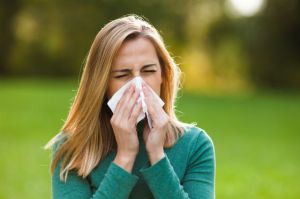Each season has its way of letting you know when it’s arrived. Flower blossoms signal the beginning of spring, increasing beach traffic is a giveaway for the start of summer, an abundance of flannel and changing leaves are trademarks of the fall, and of course, there’s the first deep freeze of winter. For 50 million Americans, however, itchy, watery eyes and a running nose are the tell-tale signs of a seasonal shift.
It can be hard to thoroughly enjoy the beauty of the seasons when pollen, dust and other allergens decide to camp out in your eyes and blur your view. If you suffer from eye allergies, we’ve provided practical solutions you can implement to help reduce symptoms.
Eye Allergy Symptoms
Symptoms can vary for each individual, so be sure to consult an allergist for specifics. These are the most common for eye allergies.
- Itching.
- Redness.
- Burning.
- Clear, watery discharge from the eyes.
- Swollen/puffy eyes.
- Changes in vision.
- Light sensitivity.
- Dark circles under the eyes.
What Causes Eye Allergies?
Allergens including grass, tree and ragweed pollen, dust, pet dander, household pollen and mold are what cause allergies to occur. When they come in contact with your eyes, the cells within the eyes release various substances to fight off the allergen(s). There are also allergens that don’t come in direct contact with the eyes that are still capable of causing irritation, such as specific foods or insect bites or stings. Irritants like smoke, perfume and diesel exhaust can also bring on symptoms.

Solutions
Unfortunately, there is no way to avoid eye allergies completely, but you can reduce the severity of the symptoms. One of the first things you can do is see your eye doctor before the time you anticipate your allergies to be the worst and get tips on how to reduce your sensitivity.
Here are a few more tips the American College of Allergy, Asthma and Immunology recommends for dealing with eye allergies, whether you are indoors or out.
Indoor Exposure
- Keep the windows closed during high pollen periods – usually mid-morning and early evening.
- Use air conditioning in your car and in your home. Make sure both of these are functional and clean on a regular basis.
- Try to keep the humidity in your home low (between 30 and 50 percent) to avoid mold build-up.
- Use a dehumidifier in damp, humid places like the basement, and empty and clean it often.
- Be sure there are no water leaks and standing water, particularly in the basement.
- Have bedding covers and sheets that limit dust mite exposure.
- Wash bedding frequently using hot water at at least 130 degrees, at least weekly.
- Clean mold with detergent and a 5% bleach solution.
- Keep carpeting, linens and stuffed animals to a minimum, as dust mites can collect with these items.
- Clean floors with a damp – not wet – rag or mop rather than dry-dusting or sweeping.
- If you have non-hypoallergenic pets, be sure to keep them out of the bedroom at all times and bathe them at least once weekly.
Outdoor Exposure
- Avoid being outside for an extended amount of time during high pollen periods.
- Wear glasses or wrap-around sunglasses to keep pollen and other eye allergy triggers from getting into your eyes.
- After petting that adorable dog you see while walking outdoors or playing with your cats (or any non-hypoallergenic animal for that matter), be sure to wash your hands thoroughly with soap and water.
- Don’t rub your eyes. Rubbing your eyes releases more histamine – your immune system’s defense against irritants – which can aggravate the symptoms enough to cause an eye infection.
- Take a shower at night and gently clean your eyelids to remove pollen that might have accumulated during the day and could cause eye irritation as you sleep.
Contacts and Glasses
Contact lenses can attract and gather allergens. Wear disposable contacts to avoid the buildup of irritants.
Wearing glasses is also a good alternative, especially during peak allergy seasons like spring. The lenses will block a good portion of allergens. Plus, AAA members get 50% off lenses with the purchase of a frame from LensCrafters*.
Medications
If you’ve done the above already, but the symptoms just aren’t going away, consider using medications designed specifically for eye allergies. There are multiple types of medications available, but be sure to consult your eye doctor about which works best for you and side effects.
- Antihistamines reduce your body’s “attacks” against allergens – sneezing, runny nose, etc.
- Decongestants help to shrink swollen nasal passages for easier breathing. They also reduce the size of of blood vessels on the white of the eye to relieve redness. Some medications contain both an antihistamine and a decongestant.
- Non-steroidal anti-inflammatory medication, or NSAID for short, is a type of eye drop that might be prescribed to reduce swelling, inflammation and other symptoms associated with seasonal allergies.
What’s your plan for seasonal eye allergies? Have advice for others? Let us know in the comments!


















